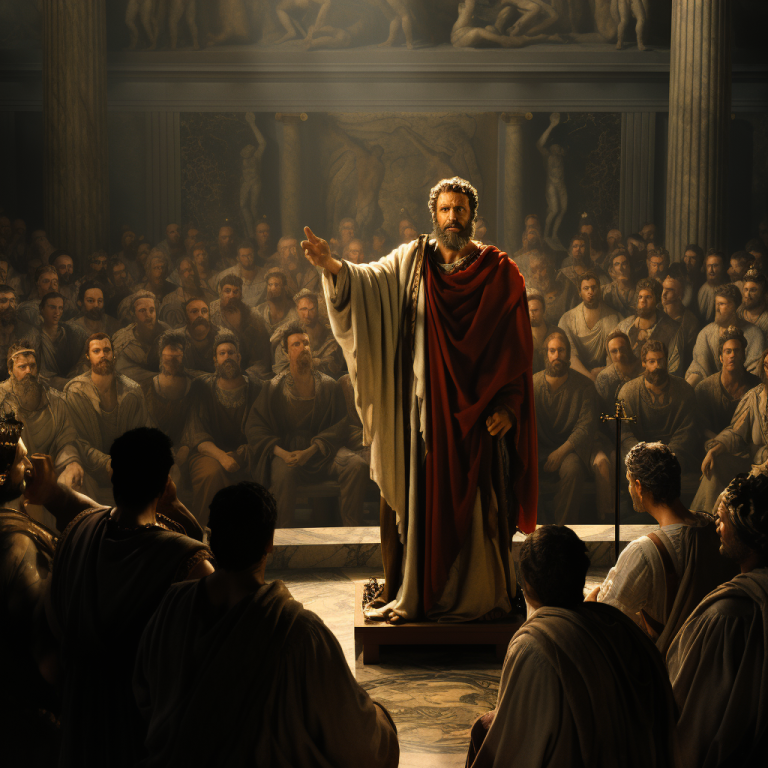
Welcome everyone, to a profound exploration of the stoic virtue of courage. Today, we embark on a journey to delve into the essence of courage as understood by the Stoic philosophers. Prepare yourself for a deep dive into this timeless virtue that holds the power to transform our lives.
There are many times in life when all of us need to be courageous, whether that’s in our relationships with employers, parents, partners or friends, or plain old joe public that we happen to bump into in the streets. In modernity courage is something that we associate with physical bravery thanks mostly to the influence of Hollywood where Tarzan wrestles with a lion or a crocodile in order to save Jane, likewise Bruce Willis gets to kill the bad guy after overcoming all sorts of life-threatening dangers and adversaries.
Yet, courage, according to the Stoics, surpasses mere physical bravery. You can be mentally courageous too, whether that’s asking a girl out on a date and overcoming the fear of rejection, which for young men everywhere is a hellishly difficult thing to do or even asking the boss for a pay rise. That takes strength of character! Courage is also required to go into business for yourself knowing well in advance that you are more likely to fail than to succeed, not because of any incompetence on your own part, but simply because that is the nature of business, that’s the nature of the universe that we live in. We are all condemned by the laws of physics to fail more often than we succeed. The future is always uncertain, and the best planned for outcomes often fail to materialise due to circumstances beyond our control. Sometimes, that’s the result of bad luck, unforeseen circumstances or more often than we’d like to admit, the ill will of other people, which is why we need a good grasp of the stoic virtue of courage to guide us through life’s difficulties.
Courage is an inner strength, a resilience of spirit that empowers us to face life’s challenges with unwavering determination. The Stoics believed that true courage lies in our ability to cultivate this inner fortitude, regardless of external circumstances.
From time to time, we stand upon the precipice of uncertainty, gazing into the abyss. If you haven’t already done this, you won’t have to wait too long because at some point in your life you will have to. Within human existence, the abyss is both metaphorical and literal, it’s ever present, waiting to swallow us up whenever we fail or are pushed into it by unpredictable events, the abyss is failure, death, and destruction, but nevertheless it’s a necessary part of life, an inevitable aspect of life that makes everything that we do meaningful. Success is meaningless if there’s no such thing as failure, life is meaningless if there’s no such thing as death, both points that are often overused by motivational coaches and feel-good gurus out there who repeat them so often as to make us sick to death of the sound of them, but that doesn’t mean that they are not true, only that they are overused by philosophical pornographers! Death makes life meaningful; failure makes success valuable.
Indeed, the esteemed stoic philosopher Seneca wrote: “He who fears death will never do anything worthy of a living man.” Seneca understood that true courage lies in transcending the fear of mortality and embracing the challenges that life presents. It is through this embrace that we can find the strength to lead a life of meaning and purpose.
In the face of this daunting reality, we must choose to embrace our fears rather than be consumed by them. We have to make our lives meaningful by making good choices and staying true to our own personal best vision of ourselves, that vision will be truly unique, authentic, a product of our Jungian superego and nothing else and not the construction of outside sources such as well-meaning parents, friends, family members, teachers, and politically active lecturers from the local Marxist training camp, that were formally colleges or universities. Our own inner vision of our best self is the one that counts free of outside influences. This means that from time to time we will have to just say ‘no,’ to people, that in and of itself can be courageous. Indeed, the French existentialist philosopher Jean Paul Sartre lived by this principle, I’m paraphrasing him when I say that you know you’re being authentic whenever you say ‘no.’ For example, if you asked him to meet you at 4pm on Friday in the nearby café so that he could tell you all about his existentialism he would deliberately not turn up. To me he sounds like a bit of a dick, but that’s the price we have to sometimes pay for authentic living. That’s another quote that I’ll have to dig out for you and show you in a future video.
If you want to know how to access this best vision of yourself and learn to be led by it, then you need to study the work of the Swiss psychiatrist and psychoanalyst Carl Jung. The conscious mind rides on the back of the subconscious like an ant on the top of an elephant. The conscious mind is seldom, if ever in control. We must learn to listen to our subconscious mind and make it conscious in order to individualise and live an authentic life. Carl Jung famously said:
“Until you make the unconscious conscious, it will direct your life and you will call it fate.”
Let me make this absolutely clear to all of the young folk out there. Learn the lessons of Carl Jung, study his work, watch YouTube videos on the subject, learn about the unconscious mind and discover where your desires, wants and lusts all come from, the earlier the better. I wish someone had told me about it when I was young, but there again the internet back then was a large brick building called a library. If you don’t study your own mind, you will waste your life!
As if this isn’t enough, Socrates even more famously said: ‘The unexamined life is not worth living.’
Epictetus, another influential Stoic thinker, emphasized that courage is the ability to endure hardships while maintaining our composure. He imparted the wisdom, “Do not seek for things to happen the way you want them to; rather, wish that what happens happens the way it happens: then you will be happy.” Epictetus reminds us that courage involves accepting the uncontrollable and adapting our mindset to find contentment within the present moment. It was a common punishment back in the days of ancient Rome for philosophers and political dissidents to be sent into exile, beyond the benefits of civilisation, to be dumped on a random island in either the Mediterranean or the Aegean seas and left to fend for yourself. Lots of romans saw this as a fate worse than death, but not Epictetus who urged us to keep the threat of death and exile permanently in our minds, to become accustomed to them, to walk with them and make friends with the idea that terrible things may happen to us due to circumstances beyond our control, and that we should make peace with this when he said:
“Let death and exile, and all other things which appear terrible, be daily before your eyes, but death chiefly; and you will never entertain any abject thought, nor too eagerly covet anything.”
Picture a storm raging outside. The winds howl, and the rain beats against the windows. In the same way, life can present us with storms of adversity and hardship. The Stoic, like a sturdy ship navigating treacherous waters, confronts these challenges head-on. This is courage, to press on anyway and skilfully navigate the challenges of life.
Marcus Aurelius, the Roman Emperor, and Stoic philosopher, believed that courage is intimately linked with the pursuit of wisdom and virtue. He wrote, “If it is not right, do not do it; if it is not true, do not say it.” Aurelius understood that true courage involves aligning our actions and words with our deepest moral principles, regardless of external pressures. It is through this alignment that we can find integrity and strength in our character.
However, the Stoics caution us that courage is not a call to recklessness or impulsive action. It is the ability to maintain composure and serenity in the midst of chaos. Courage allows us to think rationally, to assess situations with clarity, and to act wisely.
Take a moment now to reflect on the courage that resides within you. It may be a strength that has yet to be fully realized, waiting patiently for you to embrace it. The Stoics encourage us to nurture this virtue, for it has the power to transform our lives and grant us the resilience to endure life’s hardships.
Through the practice of courage, we learn to accept our limitations and find solace in the realization that we are not in control of everything. We develop the resilience to endure hardship, to persevere in the pursuit of what is morally right, and to stand up against societal pressures.
As we walk the path of courage, we discover the beauty of living in the present moment. We learn to savour life’s joys and face its tribulations with a steadfast heart. It is through courage that we find the strength to face the world as it is, not as we wish it to be.
So, dear friends, let the wisdom of the Stoics guide you on your journey to embody courage. Embrace the challenges that life presents, for as Epictetus wisely said, “Difficulties show men what they are.” It is in those moments of adversity that you have the opportunity to cultivate your inner fortitude and discover the depths of your character.
In a previous video I did promise you the following quote from Sigmund Freud a contemporary of Carl Jung and an influential teacher to him for a while, he said:
“One day, in retrospect, the years of struggle will strike you as the most beautiful.”
And on a personal know, I understand what he means. In my own experience of life, the universe and everything there’s been many years of struggle that I’ve mentioned in previous videos just to prove that my own philosophical perspective is one of lived experience leading to wisdom and whilst those experiences were unpleasant at the time, they did help shape me into the person that I am today, like a sharp blade, heated and tempered in the forge, now I am strong, before I was weak.
Stand tall, for Marcus Aurelius reminds us, “You have power over your mind – not outside events. Realize this, and you will find strength.” Even when the chips are down and the suffering is unimaginable, we must hold true to our course, or be courageous enough to chart for ourselves another one. We must remember that true courage lies in recognising that we have control over our own thoughts and attitudes, but very little else. It’s within the mind that we reign supreme and can always be at peace regardless of whatever life happens to throw our way.
The Stoics teach us that courage is not the absence of fear, but the triumph over it. Seneca profoundly stated, “Courage is found in unlikely places.” It is in those moments when fear grips us the tightest that we have the chance to demonstrate our resilience and overcome the obstacles before us.
As we journey through life, let us remember the words of the Stoic philosophers. Let us embrace courage as an essential virtue, for it empowers us to face our fears, endure hardships, and act virtuously.
So, friends, as you embark upon your own path of courage, may you find strength in the Stoic teachings. Embrace the challenges, accept the uncertainties, and nurture the indomitable spirit within you. For it is through the practice of courage that we rise above our limitations and live a life worthy of our highest aspirations.
So, to Summarize:
The stoic virtue of courage is an essential aspect of Stoic philosophy, emphasizing the cultivation of inner strength and resilience in the face of adversity. Courage, or “andreia” in Greek, goes beyond mere physical bravery and encompasses the ability to confront and endure life’s challenges with a steadfast and determined mindset.
Stoics believe that courage stems from the realization that we have control over our own attitudes and judgments, rather than external circumstances. It involves the acceptance of the inevitable ups and downs of life and the understanding that one’s character and virtue are not determined by external events, but by how they choose to respond to them.
For the Stoics, courage involves facing fears, whether they be physical dangers, emotional turmoil, or existential uncertainties. It entails recognizing that discomfort, pain, and even death are part of the natural order of things and should not deter one from living virtuously. Courageous individuals are willing to endure hardship and discomfort in pursuit of what is morally right and just, even if it means going against societal norms or risking their own well-being.
Stoic courage also encompasses the ability to remain calm and composed in the face of adversity, avoiding impulsive reactions or being overwhelmed by emotions. It involves cultivating an inner resilience that allows one to stay focused on the present moment and respond to challenges with rationality and wisdom.
Ultimately, the stoic virtue of courage encourages individuals to embrace challenges, accept their limitations, and confront life’s difficulties with strength, perseverance, and moral integrity. By developing this virtue, Stoics believe one can lead a more fulfilling and virtuous life, regardless of the circumstances that may arise.

